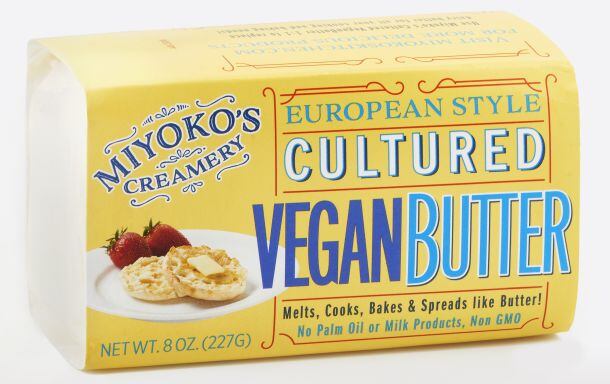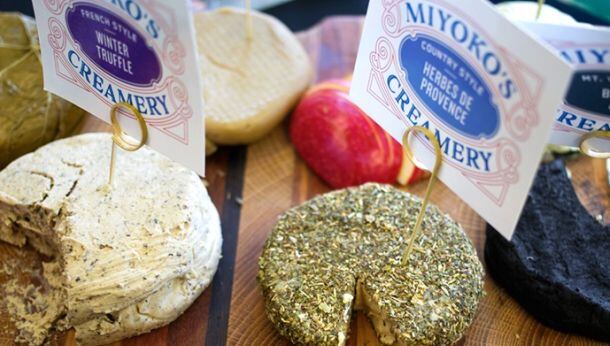Despite attempts by dairy farmers - and several members of Congress - to persuade the FDA otherwise, Americans are not confused by terms such as ‘vegan cheese,’ or ‘soymilk,’ argues Miyoko Schinner. Indeed, they are far more likely to be baffled by 'cultured nut products' and other less-than-intuitive terms manufacturers have been advised to adopt instead in order to avoid legal hot water.
“While we didn't create our products with the intention of naming them ‘cultured nut products,’ we did decide to run with it and just have fun over the absurdity of not being able to call our product what we believe it is: vegan cheese,” said the chef, author, and TV personality, who started selling her cultured cashew products online in 2014 and is now selling them in Whole Foods nationwide, regional chains such as Raley’s and hundreds of independent natural food retailers.
“It just makes regulators look ridiculous… Why is ‘cashew cream’ not allowed, while ‘cream of wheat ‘or ‘milk of magnesia’ are acceptable? Why can goat cheese be called such when the standards refer to lacteal secretions of a cow?
“It's confusing and contradictory even as currently stated, and yet consumers clearly understand the difference between goat cheese and cow cheese, heavy cream and cream of wheat.”
Dairy Pride Act would require FDA to issue guidance on enforcement of “mislabeled imitation dairy products” within 90 days
Schinner was speaking to FoodNavigator-USA as Senator Tammy Baldwin (D-WI) introduced the Dairy Pride Act* to the Senate, which would “require that non-dairy products made from nuts, seeds, plants, and algae no longer be confusingly labeled with dairy terms like milk, yogurt, and cheese.”
It would also permit products from the lacteal secretions of other hooved mammals such as goats to be described as 'milk,' 'cheese,' and 'yogurt.'

The bill would require the FDA to issue guidance for nationwide enforcement of “mislabeled imitation dairy products” within 90 days and report to Congress two years after enactment to show it had met its obligations.
It follows a December 16, 2016 letter from 34 lawmakers urging the FDA to enforce dairy standards of identity for milk (limited to the lacteal secretions of cows), and crack down on companies it believes are openly flouting these standards.
No one is being duped
In reality, however, claims Schinner, it's pretty hard to argue that consumers are confused by plant-based products bearing the terms ‘milk,’ ‘cheese,’ and ‘yogurt,’ because they are always accompanied by additional wording (almond, soy, vegan), imagery (eg. almonds), or other disclaimed (‘plant-based,’ ‘dairy-free’) that make it abundantly clear that they are not made from cow’s milk.
Indeed, given that many consumers are buying these products precisely because they are dairy-free, ambiguity on this point is not in anyone’s interests, she said.

Standards of identity: Drop, rather than revise?
So should the standards of identity be amended or ditched altogether?
Simply revising the standards to include plant-based products “could definitely be a way to go, but may be more complicated than initially thought,” she said.
“Should standards of identity be based on the ingredients, processing methods, nutritional value, appearance, flavor, or functionality?”
The simplest thing to do might just be to drop them altogether, she suggested: “If the packaging clearly states the origin or nature of the product -- vegan cheese, cashew based cheese - consumers aren't going to be confused.
“It's a new frontier and the face of food is going to change faster and faster in ways that we haven't even thought about yet - think cultured meat and milk - so these standards [of identity] are outdated and arcane and should be ditched altogether.”

Founded by chef, author, and TV personality Miyoko Schinner, Miyoko’s Kitchen got off to an explosive start in 2014 and has been battling to keep up with demand ever since, says Schinner, who started selling her wares online and is now in most Whole Foods regions, regional chains such as Raley’s and hundreds of independent natural food retailers.
Schinner – who recently moved to a new production facility in Petaluma, CA, more than five times the size of its original site in Fairfax, CA - has also persuaded a series of high-profile investors to back her cultured nut venture, from Tofurkey founder Seth Tibbott and Wildwood Natural Foods founder Billy Bramblett to Obvious Ventures, the VC firm started by Twitter co-founder Ev Williams.
“The demand and positive response for our vegan cultured nut products has exceeded our wildest expectations. There is a core vegan audience that passionately follows us, plus people that are lactose intolerant or have a milk protein allergy. But the wider audience is health-conscious foodies, and people that are looking for something new, or think that the dairy industry isn’t sustainable… and that’s before you even think about the treatment of animals.”
NMPF: ‘None of these imitators provides the same high quality nutrition offered by real milk’
Supporters of the Dairy Pride Act, however, argue that the issue is not so much that consumers are being duped into thinking almond milk comes from cows, but that it is nutritionally equivalent to cow’s milk.
Indeed, this sense that nut, seed and legume ‘milks’ are being falsely advertised as nutritionally equivalent or superior to dairy milk appears to be at the route of the frustration dairy commentators feel, with Jim Mulhern, President and CEO of the National Milk Producers Federation arguing that “None of these imitators provides the same high quality and quantity of nutrition offered by real milk.”
Janet Clark of Vision Aire Farms in Eldorado, Wisconsin, also points out that dairy “has built a strong reputation as a reliable source of important nutrients we need daily.”
She added: “To use these dairy terms on plant-based products undermines the real value that dairy provides in the form of naturally occurring Calcium, Vitamin D, Vitamin A among others. Consumers associate dairy with the nutrients they need, and those are naturally occurring in milk from cows.”
"Less than 5% of adult females consume the recommended 3 cup equivalents [of dairy] per day. Overall, more than 80% of the entire population of the United States does not meet the daily dairy intake recommendation...
"The amount of calcium per calorie is lower for most plant-based alternative milk products. To obtain the amount of calcium contained in one cup of non-fat fluid milk from a plant-based milk alternative, the portion size and calorie intake must be greater."
The Dairy Pride Act, 2017 (click HERE to download a PDF).
Aren't there bigger fish to fry?
Schinner, however, says it’s pretty clear that dairy alternatives will continue to gain momentum, even in markets where manufacturers are prevented from using terms such as ‘milk’ or ‘cheese,’ and that even if the dairy lobby wins this battle, it is still losing the war.
“Consumers decide what they want, and it's clear they want plant-based options, which is why they are outpacing traditional animal based products in growth.Traditional industries are threatened by this and are doing what they can to slow down growth, but ultimately, it's consumers who decide.”

She added: “I think it [the Dairy Pride Act] says a lot about the representatives who are asking the FDA to bolster the standards of identity. It clearly says who is lining their pocketbooks. Aren't there bigger problems to combat? Unemployment? Food security? Housing? Really? What to call your vegan cheese product is that important?”
You can waste a lot of time talking about things like this
Consumers may harbor misconceptions about a lot of things when it comes to ‘plant- vs animal-based’ agriculture, particular when it comes to sustainability, observed Tim Joseph, founding farmer and CEO of grass-fed dairy brand Maple Hill Creamery.
But arguing over who can use the term ‘milk’ may not be the best use of time and resources, he suggested.
“I do get frustrated when I hear people make assumptions about what’s more environmentally-friendly [eg. dairy vs ‘plant-based’] as not all dairy is the same, and there are so many benefits to grazing,” he told FoodNavigator-USA.
“But I don’t get too wound up about this [plant-based ‘milk' labeling] issue. I think you can waste a lot of time talking about this, and sometimes I think we should look inward and focus on our own game.”
*The Defending Against Imitations and Replacements of Yogurt, milk, and cheese to Promote Regular Intake of Dairy Everyday Act (DAIRY PRIDE Act)
